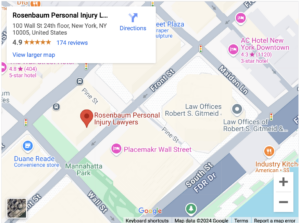Surgical Errors and Medical Malpractice: An Introduction
Specialization is a keystone of the medical profession. It is good for doctors, who reap the financial and professional rewards that accompany a niche practice, and it is good for patients, whose health stands to benefit from higher levels of physician expertise. But, it is no secret that some fields carry more risk than others.
Without a doubt, surgical practice is a precarious medical discipline. Lucrative, yes, and certainly intellectually stimulating – but not for the faint of heart. By its very nature, a surgical procedure involves an invasive entrance into the human body in which only a delicate and skilled touch can keep the patient out of harm’s way.
As the slightest misstep in surgery can inspire grave consequences, it is little surprise that surgeons are sued for medical malpractice at a far higher rate than their professional counterparts. For the injured patients who initiate these lawsuits, proving medical negligence with the help of a New York surgical errors lawyer can allow patients access to compensation for their medical bills.
Recent Study Elucidates Surgeons’ Malpractice Risk
A 2011 report published in the New England Journal of Medicine explored the disparate rates at which physicians in 24 specialties are sued by patients. According to the findings, 15.3 percent of general surgeons face at least one malpractice claim in the average year. This rate is more than twice that of doctors overall, and was outpaced in the study only by two subspecialties (both of them surgical): neurosurgery and thoracic surgery.
Even the most skilled surgeons are likely to be hauled into court over a mistake at one point or another. The study’s authors estimated that 99 percent of physicians practicing in “high risk” specialties like surgery will have been a defendant in one or more malpractice lawsuits by the age of 65.
Why Are Medical Mistakes More Common Among Surgeons?
Nearly every medical procedure carries some degree of risk – and physicians cannot be sued over harmful effects that arise through no fault of their own. Yet, the chief reason surgeons are the subject of more malpractice claims is nonetheless inherent to the risky nature of their line of work: there is far less of a margin for error (not to mention a higher degree of stress on practitioners) in surgery compared to say, prescribing medication for a minor skin condition, or diagnosing a mild concussion.
Mistakes in surgery, even those that spring from only a slight procedural deviation, are more likely to be highly damaging. Thus, these errors are also more likely to come to light and to be financially worthwhile as the subject of a court action.
Establishing Doctor Negligence: How Injured Patients Secure Their Recovery
The legal challenge for those injured by a surgical mistake is proving negligence, or wrongdoing, on the part of their physician. This is no easy feat without the right legal help: industry reports suggest that only about half of patients who have suffered medical harm due to negligence ultimately recover monetary damages.
So how does one prove a surgeon’s negligence to a judge or jury? Evidence must be introduced which shows that the physician breached the applicable surgical standard of care, and through that breach caused some injury to the patient.
Evidence of a shortfall which amounts to surgical malpractice can come in a variety of forms, including medical records, expert opinions as to the cause of an injury and eyewitness testimony (from a nurse who overheard a surgeon admit a mistake, for instance). A court process known as “discovery” empowers plaintiffs and their lawyers to gather information that may have evidentiary value but would otherwise be inaccessible to them. Through discovery, your lawyer should conduct a thorough investigation to uncover acts of medical malpractice.
Still, even with the use of discovery as a procedural sword, it is well recognized that injured plaintiffs face numerous difficulties in proving medical negligence. A legal doctrine known by the Latin phrase “res ipsa loquitur” helps counterbalance this reality for many patients who are injured during a medical procedure, but do not know exactly what caused the harm.
Under the res ipsa loquitur doctrine, if the result that occurred would not have happened absent some negligence by the health care provider, no further showing of negligence is required by the plaintiff; the burden of proof shifts to the doctor defendant, who then must show he or she was not negligent in order to avoid liability. Res ipsa loquitur is a powerful tool, but may only be invoked under limited circumstances, namely when it is obvious that the injury is the type that would not normally occur absent medical negligence (for example, a surgical instrument being left inside a patient) and direct evidence of the cause of the injury is unobtainable.
Malpractice-Spurred Surgical Safety Procedures Help Curb Preventable Mistakes
Malpractice claims provide a valuable source of data in developing improved surgical techniques. In one recent paper on the prevention of surgical malpractice, researchers proposed a surgical safety checklist that could have prevented 40 percent of the deaths and 29 percent of the incidents that led to permanent bodily injury in the pool of malpractice cases studied.
There is some evidence that the incentives created by malpractice liability and corresponding safety improvements are taking hold: a major retrospective analysis presented at the 2011 American College of Surgeons Annual Clinical Congress found that the total number of surgical malpractice claims in the United States has decreased by an average of 154 claims every year since 1990. However, while claims have fallen, payouts have increased over the same time period, with the average settlement or judgment sum for surgical malpractice growing annually by $3,200.
The best estimates suggest two to three percent of patients suffer harm due to medical negligence. If you or a family member may be among them, contact an experienced medical malpractice lawyer to find out how to pursue the compensation you are owed and to help keep others from suffering similarly in the future.
Contact the New York City Personal Injury Law Firm of Rosenbaum Personal Injury Lawyers for Help Today
If you’ve been injured in an accident in Manhattan, NY, and need legal help, contact our personal injury lawyers at Rosenbaum Personal Injury Lawyers to schedule a free consultation. We also serve in Brooklyn and the Bronx.
Rosenbaum Personal Injury Lawyers – New York City Office
100 Wall St, 24th Floor
New York, NY 10005
(212) 514-5007
Our firm is located near you. We have an office in NYC
Find us with our GeoCoordinates: 40.7051415,-74.0067386
Rosenbaum Personal Injury Lawyers – Bronx Office
1578 Williamsbridge Rd suite 3b
Bronx, NY 10461
(929) 447-2347
Our firm is located near you. We have an office in the Bronx
Find us with our GeoCoordinates: 40.8468944,-73.8483118
Rosenbaum Personal Injury Lawyers – Brooklyn Office
32 Court St #704
Brooklyn, NY 11201
(718) 550-3601
Our firm is located near you. We have an office in Brooklyn
Find us with our GeoCoordinates: 40.692948,-73.991038



